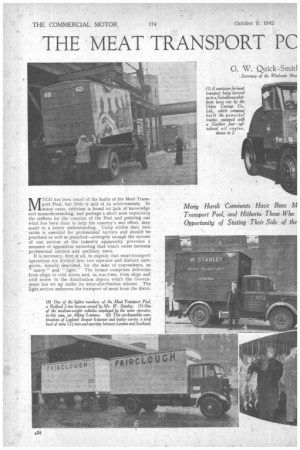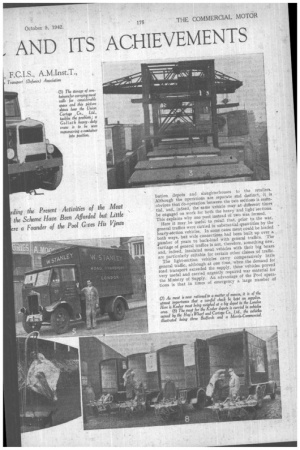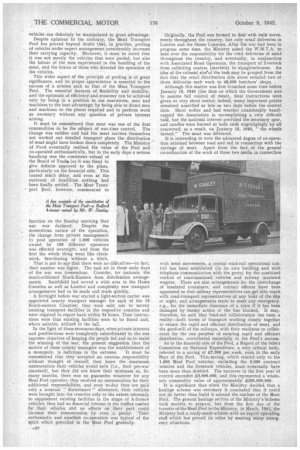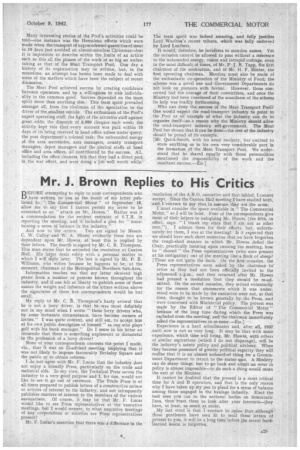THE MEAT TRANSPORT PC , AND ITS ACHIEVEMENTS
Page 26

Page 27

Page 28

Page 31

If you've noticed an error in this article please click here to report it so we can fix it.
MUCH has been near d of the faults of the Meat Transport Pool, but little is said of its achievements. In many cases, criticism is based on lack of knowledge and misunderstanding, and perhaps a short note explaining the reatons for the creation of the Pool and pointing out what has been done to help the country's war effort, may assist to a better understanding. . Unity within-their own ranks is essential for professional carriers and should be practised as well as preached—strangely enough the success of one section of the industry apparently provokes a measure of opposition exceeding that which exists between professional carriers and ancillary users.
It is necessary, first of all, to explain that meat-transport • operations are divided into two separate and distinct categories, usually described, for the sake of convenience, as " heavy " and ' light." The former comprises deliveries from ships to cold stores and, in war-time, from ships and cold stores to the distribution depots which the Government has set up under its meat-distribution scheme. The light section embraces the transport of meat from the distri bution depots arid slaughterhouses to the retailers. Although the operations are separate and distinct, it is obvious that to-operation between the two sections is essential, and, indeed, the same vehicle may at different times be engaged on work for both the heavy and light sections. This explains why one pool instead of two was formed.
Here it may be useful to reCall that, prior to the war, general traffics were carried in substantial quantities by the heavy-section vehicles. In some cases meat could be loaded both ways, but wide connections had been built up over a ,kumber of years to back-load with o traffics. The carriage of general traffics is not, therefore, something new, and, indeed, insulated meat vehicles with their big boxes are particularly suitable for certain other classes of traffic.
The light-section vehicles carry comparatively little general traffic, although at one time, when the demand for road transport exceeded the supply, these vehicles proved very useful and carried urgently required war material for the Ministry of Supply. An advantage of the Pool operations is that in times of emergency a large number of vehicles can definitely be manipulated to great advantage. Despite opinions to the contrary, the Meat Transport Pool has proved beyond doubt that, in practice, pooling of vehicles under expert management considerably increases their carrying capacity. Moreover, it must be noted that it was not merely the vehicles that were pooled, but also the labour of the men experienced in the handling of the meat, and the brains of those who directed the operation of the vehicles. .
This wider aspect of the principle of pooling is of great significance, and its proper appreciation is essential to the success of a scheme such as that of the Meat Transport Pool. The essential features of flexibility and mobility, and the optimum of efficiency and economy can be achieved. only by being in a position to use executives, men and machines to the best advantage; by being able to direct men and machines to the places required and to perform work as necessary without any question of private interest arising.
It must be remembered that meat was one of the first commodities ta be the subject of war-time control. The change was sudden and had the meat carriers themselves not worked out detailed transport plans the distribution of meat might have broken down completely. The Ministry --of Food eventually realized the value of the Pool and co-operated enthusiastically, but in the early days a serious -handicap was the consistent-refusal of the Board of Trade (as it was then) to give definite approval to the plans, particularly on the financial side. This caused much delay, and even at the outbreak of hostilities nothing had been finally settled. The Neat Transport Pool, however, commenced to function on the Sunday morning that war was declared. Despite the momentous nature of the operation, the change from private management to pool operation of 1,600 vehicles owreed by 100 different operators was effected overnight, and from the first the whole thing went like clockwork, functioning without a hitch.
That is not to say-that there were no difficulties—in fact, their number was legion. The task set in those early days of the war was. tremendous. Consider, for instance, the much-criticized South-Eastern Area distribution arrangements. Smithfield had served a wide area in the Home Counties as well as London and completely new transport arrangements had to be made and made quickly.
A fortnight before war started a light-section carrier was appointed county transport manager for each of the 13 South-eastern Counties; they were sent out to survey existing transport facilities in the respective counties and were required to report back within 24 hours. Their instructions were that existing facilities were to be found and, where suitable, utilized to the full.
In the light of those strenuous days, when private interests and predilections were 'completely subordinated to the one supreme objective of keeping the people fed and so, to assist the winning of the war, the present suggestion that the motive of these county managers was the establishment of a monopoly, is ludicrous in the extreme. It must be remembered that they accepted an onerous responsibility without thought of reward; they knew the maximum remuneration their vehicles would eain (i.e., their pre-war standard), but they did not know their minimum as, for many months, there was no guarantee whatever for any Meat Pool operator; they received no remuneration for their additional responsibilities, and even to-day they are paid only a nominal "disturbance " allowance; their vehicles were brought into the counties only to the extent necessary to supplement existing facilities in the shape of A-licence vehicles; they had no financial interest in the traffics carried by their vehicles and no efforts on their part could increase their remuneration by even a penny. 'Their enthusiastic and unselfish co-operation was typical of the Spirit which prevailed in the Meat Pool generally. Originally, the Pool was formed to deal with bulk movements throughout the country, but only retail deliveries in London and the Home Counties. After the war had been in progress some time, the Ministry asked the W.M.T.A. to take over the responsibijity for the road deliVeries of meat throughout the, country, and eventually, in conjunction with Associated Road Operators, the transPort of livestock from collecting centres (markets) to -slaughterhouses. An idea of the colosal sizeof the task may be grasped from the fact that the retail distribution side alone entailed two or three deliveries each week to 48,000 butchers' shops.
Although this matter was first broached some time before January 15, 1940 (the date on which the Government was to assume full control of meat), final instructions were given at very short notice; indeed, many important points remained unsettled as late as two days before the control date. Short notice and bad weather considerably handicapped the Association in accomplishing a very difficult task, but the national interest-provided the necessary spur, and candles were burned at both ends ungrudgingly by all concerned; as a result, on January 15, 1940, " the wheels turned." The meat was delivered, It is interesting to note the advanced degree of co-operation attained between road and rail in connection with the carriage of meat. Apart from the fact, of the general co-ordination of the work of those two media in connection
with meat movements, a central road-rail operational control has been established (in its own building and with telephone communication with the ports) for the combined control of road-insulated vehicles and railway insulated wagons. There are also arrangements for the interchange of insulated containers, and contact officers have been appointed so that railway representatives can get into touch with road-transport representatives at any hour of the day or night, and arrangements made to meet any emergency. e.g., for the immediate clearance of a train if it -has been damaged by enemy action or the line blocked. It may, therefore, be said that road-rail collaboration has been a reality—both forms of transport working closely together to ensure the rapid and efficient distribution of meat, and the good-will of the railways, with their readiness to collaborate for the one purpose of securing rapid and efficient distribution, contributed materially to the Pool's success.
As-to the financial side of the Pool, a Report of the Select Committee on National Expenditure, a very critical body, referred to a saving of £7,000 per week, even in the early nays of the Pool. This saving, which related only to the 1,600 Meat Pool vehicles, excluding the 5,000 contract vehicles and the livestock vehicles,. must eventually have been more than doubled. The turnover in the first year of control exceeded £3,000,000, 'and this represented a wholesale commodity value of approximately £250,000,000.
It is significant that when the Ministry decided that a haulage scheme was • necessary it concluded that it could not do better than build it around the nucleus of the Meat Pool. The general haulage section of the Ministry's Scheme took months to prepare, but from the first day of the transfer of the Meat Pool to the Ministry, in March, 1941, the Ministry had a ready-made-scheme with an expert operating staff which has proved its value by meeting many emergency situations. Many interesting stories of the Pool's activities could be _told—one instance was the Herculean efforts which were made when the transport of unprecedented quantities of meat in 10 days just avoided an almost-meatless Christmas—but it is impossible to describe within the limits of an article such as this all the phases of the work of so big an undertaking as that of the Meat Transport Pool. One day a history of its organization may be written, but, in the meantime, an attempt has herein been made to deal with some of the matters which have been the subject of recent discussion.
The Meat Pool achieved success by creating confidence between operators, and by a willingness to sink individuality in the common good. Success depended on the team spirit more than anything else. This team spirit prevailed amongst all, from the chairman of the aisociation to the driver of the smallest vehicle. -The enthusiasm of the Pool's expert operating staff; the fight of the accounts staff against great odds; the dispatch of 5,000 chequeseach week; the strictly kept rule that every account was paid within 10 days of its being received in head office unless under query; the post department's colossal task; the unbounded energy of the area secretaries, area managers, county transport managers, depot managers and the clerical staffs at head office and area offices, all contributed to the success_ All, including the office cleaners, felt that they had a direct part in the war effort, and were doing a job well worth while.
The team spirit was indeed amazing, and fully justifies Lord Woolton's recent tribute, which was fully endorsed by Lord Leathers.
It would, therefore, be invidious to mention names. Yet the occasion cannot be allowed to pass without a reference to the unbounded energy, vision and intrepid cottrage, even in the most difficult of times, of Mr. P. J. R. Tapp, the fi:-st chairman of the asscicia,tion, and of Mr. H. F. Minter, the first operating chairman. Mention must also he made of the enthusiastic co-operation of the Ministry of Food; the scheme was a novel one and Government Departments do not look on pioneers with favour. However, those concerned had the courage of their convictions, and once the Ministry had been convinced of the soundness of the scheme its help was readily forthcoming.
Who can deny the success of the Meat Transport Pool? One would expect the road-transport industry to point to the Pool as an example of what the industry can do to organise itself—as a reason why the Ministry should allow the road-transport industry self-government. The Meat Pool has shown that it can be done—the rest of the industry should be proud of its example.
[Mr. Quick-Smith, with his usual modesty, has omitted to state anything as to his own very considerable part in the formation of the Meat Transport Pool. We understand that he shared equally with those personalities mentioned the responsibility of the work and the resultant success.—En.]




















































